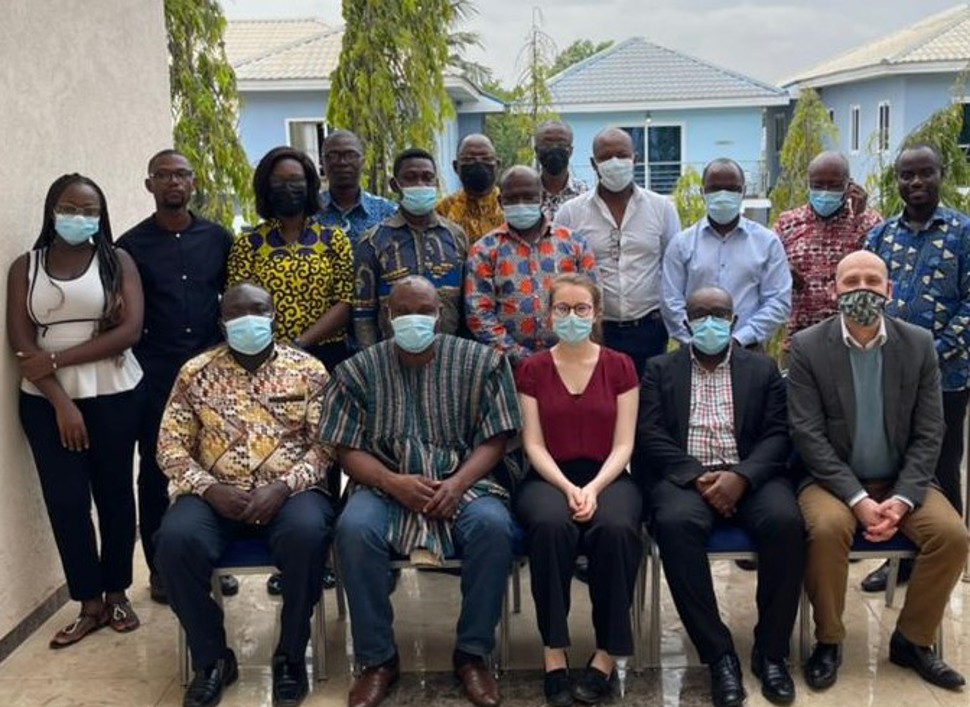Continuing to strengthen capacities for HTA in Ghana ‘post’ COVID
Article
|Updated
|A blog about recent meetings to coordinate actions and develop the workplan to support the national HTA strategy in Ghana, followed by a a three-day workshop on ‘costing analysis in economic evaluations’.
Since 2018, the Norwegian Institute of Public Health (NIPH) has been working with the Ghanaian Ministry of Health (MOH) to support efforts to institutionalize Health Technology Assessment (HTA) in the country. During the COVID-19 pandemic the collaboration continued remotely from the respective home offices. With online solutions as WhatsApp, Zoom and Microsoft Teams the work was able to continue, but could not fully replace the desire and need for face-to-face meetings. Therefore, Lieke Heupink and Lumbwe Chola, both health economists in the Global Health Cluster, travelled to Ghana to participate in various activities with the MOH, the Norwegian Embassy in Ghana, and other partners who support the national strategy for HTA.
The recent visit took place between February 28 and March 4 at the AH Hotel and Conference in Accra. The first two days were spent meeting with the MOH and partners, online and in person, to coordinate actions and develop the workplan to support the national HTA strategy. The identified priorities and areas for collaboration included dissemination and visibility of (conducted) HTAs, co-production of HTAs, capacity building activities, and strengthening the HTA Secretariat.
The workshop

The meetings were followed by a three-day workshop on ‘costing analysis in economic evaluations’ facilitated by the MOH, the International Decision Support Initiative (iDSI), London School of Hygiene and Tropical Medicine (LSHTM), and NIPH. The workshop provided an opportunity to directly translate the identified priorities into actions by building on our previous achievements and answering to identified needs.
As starting point for the workshop, we used the national HTA strategy, the HTA skills assessment conducted by NIPH, and the co-produced HTA that advised on the reimbursement of Burkitt Lymphoma by the National Health Insurance Service (NHIS). As consequence from the pandemic the co-production of this HTA was for a large part online, resulting in limited capacity building initiatives outside the core team. However, the co-production was still successful and the HTA was actioned by the Ghanaian government. For the first time childhood cancer treatments will be added to the NHIS reimbursement list. The HTA report on Burkitt Lymphoma will soon be launched and the NIPH congratulates the MOH and its partners on this milestone.
The current workshop aimed to strengthen capacities of those groups which are part of the National HTA structure. Specifically, we invited the members of the Technical Working Group (TWG) to join the workshop. The role of the TWG is to select topics for HTAs, support production of HTAs, and appraise HTAs. Following the decision to reimburse childhood cancers, a need for three more costing analysis for specific childhood cancers was identified. The TWG plays a vital role to ensure a smooth production of these analyses, for instance by providing access to protocols, cost data, and other information from the local context. However, a proper understanding and insight to the underlying methods was of interest. Besides introductions on cost analysis in economic evaluation provided by facilitators from NIPH and LSHTM, the Ghanaian core-team members shared learnings from producing the HTA on Burkitt Lymphoma. These same members, who now are also part of the TWG, will also take an active role in leading new HTAs and other capacity building initiatives. While members of the HTA secretariat will be leading the production of the three costing analysis, a start was already made during the workshop with support from TWG members.
Overall, the recent visit to Ghana highlighted the interest and momentum for HTA in Ghana. The activities during this visit do not stand alone, but are part of the partnership program 'Building Stronger Public health Institutions and Systems' (BIS) financed by Norad. More visits and workshops will be organised through this program to ensure that the national HTA structures can further strengthen their capacities and increase production of HTAs.
The meetings with the various partners were very fruitful by identifying various priority areas, as well as, bringing together partners in- and outside the country who can support the national HTA strategy. New plans for in-person activities are already being proposed, and we are looking forward continuing supporting Ghana in its HTA journey.